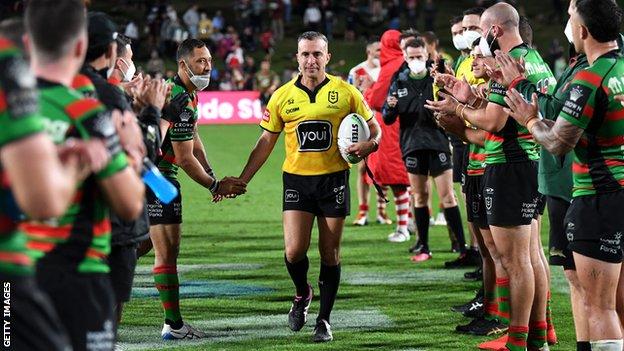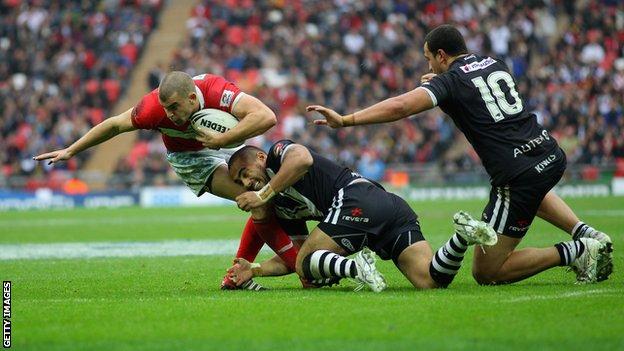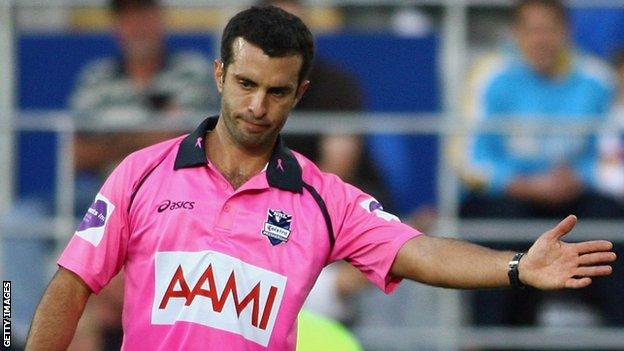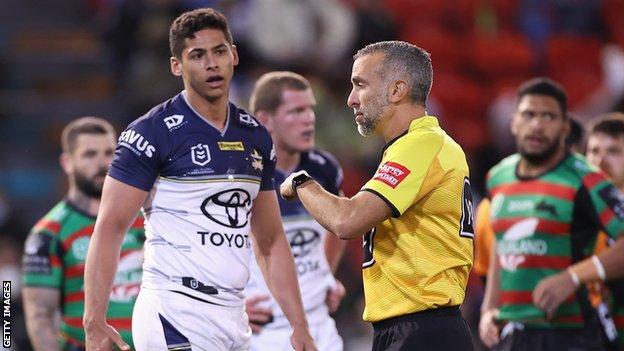[ad_1]

It was the guard of honour that really brought things home for Matt Cecchin.
“I remember my head coach coming on and giving me a hug, and just saying to him: ‘Get away, I’m starting to cry,'” Cecchin laughs.
“I never expected it – and to me, it was the perfect way to finish. If that’s the last game I ever referee, I couldn’t have asked for a better one.”
Four months on from that emotional night, Cecchin has been talking to the BBC’s LGBT Sport Podcast about his two-decade long refereeing career, along with his journey off and on the pitch.
‘It wasn’t until I said it out loud that I realised I’ve been so lucky’

Cecchin refereed his first match in 1986, when he was 12 – making his top-class debut in 2001.
The Australian went on enjoy a long career at the top level, refereeing at the World Cup as well as in the Four Nations, while also taking charge of four State of Origin games and three NRL Grand Finals.
“The game has afforded me such a great career,” Cecchin says.
“You know, my partner and I have just finished watching Ted Lasso, and there was a scene at Wembley Stadium, and I said: ‘Oh, I’ve refereed a game there!’
“And it wasn’t until I said it out loud that I realised I’ve just been so, so lucky.”
‘I didn’t want to be the token gay referee’
A career as long as Cecchin’s doesn’t come without challenges, and some of his most memorable moments have been accompanied by controversy.
He stepped away from the game for a spell in 2018, one year after a contentious – but correct – decision to disallow a late Tonga try as they narrowly lost a World Cup semi-final to England. After the match, the death threats Cecchin received prompted police in New Zealand to ask him to stay in his hotel room for his own safety.
Cecchin had previously made headlines in 2012, as he became one of the most high-profile men in Australian sport to come out publicly as gay.
By then, he was in his late 30s. Those closest to him had known about his sexuality for some time; he had first come out to his family in his mid-20s, when he was engaged to be married to the mother of his son.
“I’ve always been gay, but I didn’t know it until I was 25,” Cecchin says.
“I was engaged at the time and, once I’d identified it, I told my fiancee, my family, my son, my close friends, all within a period of two weeks.
“But I was petrified about rugby league. It’s a pretty brutal sport, and I was scared about how I may have been treated.
“And the other thing is, I wanted to be known as ‘Matt the ref’. I didn’t want to be known as ‘Matt the gay ref’, and to either miss out on games or be given games because I was the token gay referee.”
‘I feared having to deal with homophobic abuse on the pitch’

Cecchin told his refereeing colleagues about his sexuality in 2001, soon after his NRL debut.
A desire to protect his school-age son from unwanted press intrusion meant it was more than a decade before he shared his story publicly.
But when he did, the feedback was overwhelmingly positive.
“I don’t want to downplay the fear of coming out, because it’s real and very, very big,” the Australian says.
“But my experience suggests that often, the reality is nowhere near as great as the fear itself. You know, I’ve had players on the field calling me ‘brave’ because I’d come out, and I still get the odd message from people on social media saying it gave them the strength to do this and that.”
After making his sexuality public knowledge, Cecchin had a different fear – of the abuse he might receive on the pitch.
“If a player calls me ‘tosser’ and it comes loudly over the mic and I know it’s being transmitted to everyone and showing disrespect, then I have to take strong action towards that player, so that respect level is maintained at the top level,” he says.
“But the fear I had was a gay comment to me by a player on the field that I’d have to deal with. I was extremely scared about being put in that position, and how I may react. You know, would my reaction have been seen as an over-reaction? Would I have underplayed it?
“That type of thing stayed with me my whole career. If I were to calculate the percentage of thought I’d spent on refereeing, I reckon that about 20% of the time was going: ‘I hope a player doesn’t put me into that situation.’ Because it’s something I know would have been massive and I know would have got huge publicity.
“Although the reality is that sometimes, you’ve got to go through that to prove a point and show everyone what it’s really like.”
‘I feel desperate for a change, to do something different’

Cecchin regrets not using his platform more to speak on LGBTQ+ issues after coming out.
“Giving other people strength wasn’t the reason why I did it,” he says.
“I didn’t realise how much impact I had – and yeah, I think I should have been more involved in the LGBTQ+ community.”
But after bringing the curtain down on his storied career, the Australian says both he and his partner are ready for something new.
“I feel desperate for a change, and it’s not because I’m bitter or twisted about the game. I just want to do something different,” he says. “So we’ve sold the house and all the furniture, and we’ve got a caravan. We’re taking off for 12 months with no plan or set destination in mind, and we’re really looking forward to it.”
“In saying that, we’ll probably get 100 kilometres up the road and I’ll be saying: ‘Oh, I don’t like this!'”
Matt Cecchin was speaking to Jack Murley on the BBC’s LGBT Sport Podcast. You can download new episodes every Wednesday on BBC Sounds.
[ad_2]
Source link

